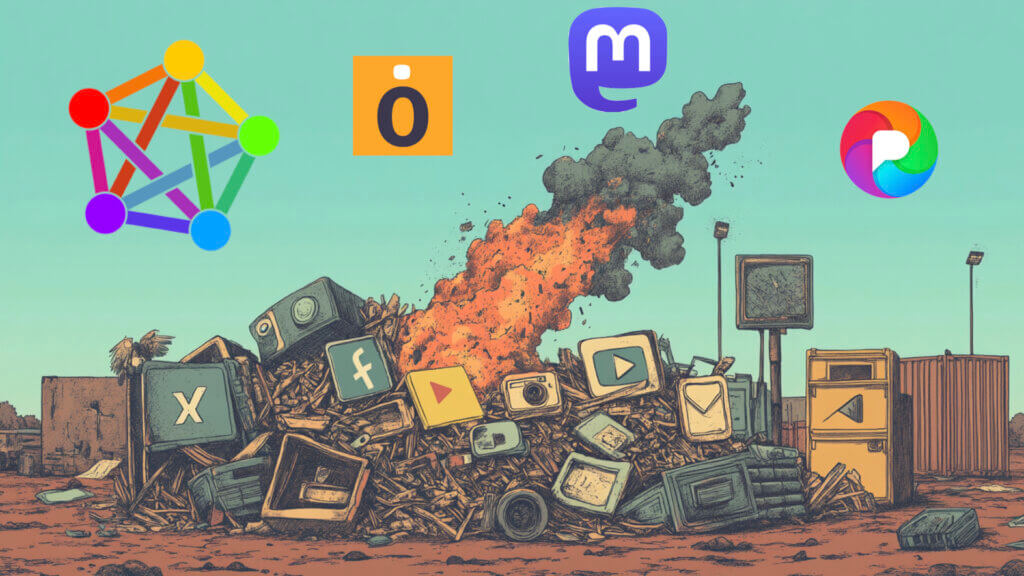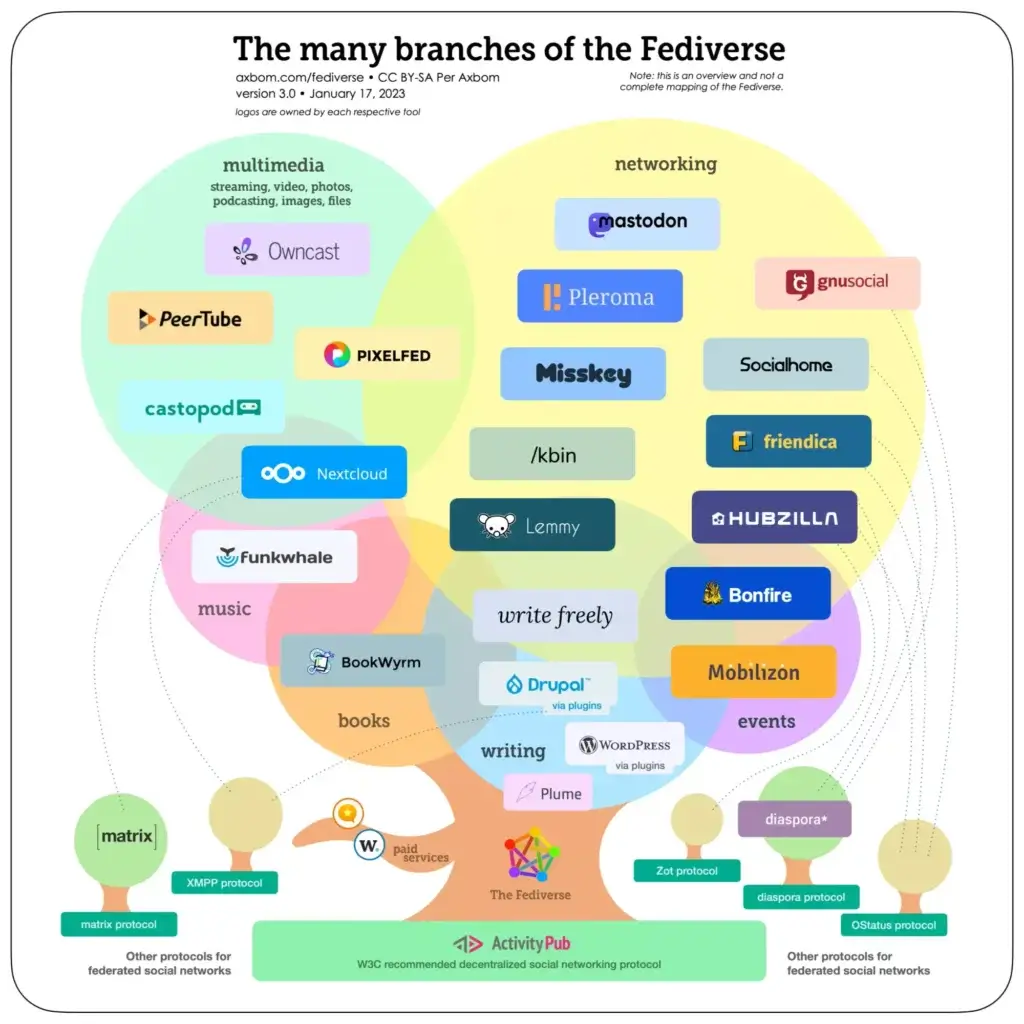 The social media platforms we once relied on for authentic connection are disintegrating. My ikigai—the reason I get up in the morning—is facilitating connection. But today’s major social media platforms—Facebook, YouTube, Instagram, TikTok, LinkedIn, X, et al.—are all owned by billionaires and tech bros who impose their political leanings on their users and/or seek to make massive fortunes from revenue streams such as ads and selling user information.
The social media platforms we once relied on for authentic connection are disintegrating. My ikigai—the reason I get up in the morning—is facilitating connection. But today’s major social media platforms—Facebook, YouTube, Instagram, TikTok, LinkedIn, X, et al.—are all owned by billionaires and tech bros who impose their political leanings on their users and/or seek to make massive fortunes from revenue streams such as ads and selling user information.
These monolithic platforms increasingly control what can be posted via opaque and ever-changing algorithms, while reducing or eliminating moderation of trolls and spammers. Bots abound, pouring AI-generated slop into users’ feeds. Though X is the most prominent example, Facebook has abandoned its fact-checking program and drastically reduced the reach of posts to followers, and platforms like LinkedIn have tuned their algorithms to reduce the reach of posts that include off-site links.
The dumpster fire will continue
Major social media platforms are a dumpster fire, with no quick fix. Users remain on these platforms due to their network effect advantage; i.e., their value increases as more users join. For example, though I find Facebook’s ethical choices increasingly repulsive, I still use the platform sparingly because it is the only online service that some friends and family use, and a few of its local and professional groups have no significant online competition.
A corollary of the network effect is that as networks grow they become full of strangers, less coherent, and harder and more expensive to moderate effectively. Large platforms also become attractive places for those who need to feel important by having many followers and who concentrate on broadcast communication rather than two-way connection.
If you, like me, are interested in authentic connection with people in ways you determine, unfiltered by secret algorithms constantly tuned to maximize revenue or political ideologies, the future is bleak.
Except…
Authentic connection platforms exist!
Luckily, places for authentic communication have existed since the early days of online communications. Current incarnations are part of the Fediverse, a network of servers interconnected via a common protocol. Here are some of the platforms:

Most of these platforms are minor players today—WordPress is a notable exception—because most people who want to be online have preferred the convenience of one or two platforms where they hope everything and everyone is accessible. However, the disintegration of major platforms is causing users to defect. X, for example, has been losing active users since 2022. Facebook had zero growth in 2024 and will likely decline in 2025 due to Zuckerberg’s decision to eliminate in-house fact-checking.
What sets ethical social media platforms apart? Here are five key features that define them:
1—No secret algorithms
Unlike major social media networks, ethical social media platforms provide simple chronological feeds that each user controls. Users create their feeds by following other users, search terms, and hashtags. Platforms allow blocking at the user and server levels, allowing each user to choose what they want to see and avoid in their feeds.
2—Open protocols
Ethical social media networks use open protocol standards designed for decentralized social networking, such as ActivityPub (2018) and AT Protocol (2022). The internal workings of major social media platforms are proprietary and subject to change. (For example, Twitter abruptly banned third-party clients in 2023.)
3—Community-funded and managed
In stark contrast with the major social media platforms, ethical social media platforms aren’t owned by billionaires. Rather, they are community-funded and managed.
Perhaps the best-known ethical social media platform, Mastodon, is a registered non-profit. A small team led by Eugen Rochko maintains its software. Donations, not venture capitalists, crowd-fund Mastodon’s thousands of independent servers.
4—No ads
Because ethical social networks are crowd-funded, they do not need to raise revenue via paid advertising. All major social networks display advertisements. (Threads is planning to introduce ads in 2025.)
5—Decentralized (aka Federated)
Ethical social networks are decentralized, aka federated. Anyone is free to create and run a server of these platforms. Currently, for example, 8,500+ independent servers run the Mastodon social networking service. Because federated servers use a common protocol, you can search for content across the entire network and follow and interact with anyone, regardless of where their account is hosted.
Administrators can customize a server for a particular community. This allows like-minded users to congregate on the same server and support each other. Again, Mastodon is a good example of how flexible federated networks can be. One advantage of this flexibility is that moderation—which is very expensive to provide effectively at scale—is easier when there are thousands of individually moderated servers rather than one large monolithic service.
Federation is often experienced as a disadvantage by those who are only familiar with large social media platforms because it can initially complicate the seamless discovery and following of content and people on other servers. Folks forget they also had to surmount a learning curve when they joined platforms like Twitter and Facebook.
Is Bluesky an ethical social media platform?
No. Bluesky satisfies only three of the five ethical social media criteria listed above: it currently has no ads and uses a chronological algorithm and an open protocol (AT Protocol).
It’s possible, in principle, to establish additional Bluesky servers. In practice, a year after Bluesky claimed this was possible, no additional public servers exist. (Currently, Free Our Feeds, an attempt to raise $20 million to build additional servers has only raised $83,000. Not promising.)
Most damningly, crypto bros with ties to Russia own Bluesky. Once initial funding runs out, either content moderation will deteriorate, or the owners will require new revenue streams (like ads). The platform is, therefore, likely to enshittify in the same way as X and Facebook.
What you can do
Worried about the decline of social media? Here’s how you can make a difference. When you don’t like what’s happening on any of the major social media platforms you currently use, you can move to an appropriate ethical alternative. Vote with your feet! Leave the major platforms you currently use and join ethical social media platforms that replace them. Here are my suggestions for places to go, together with current (January 2025) statistics:
X, Threads → Mastodon (~9M+ users, 8,500+ servers)
Facebook → Friendica (21K+ users, 200+ servers)
Instagram → Pixelfed (600K+ users, 700+ servers)
Youtube → PeerTube (250K+ users, 950+ servers)
Reddit → Lemmy (450K+ users, 70+ servers)
Event communities → Mobilizon (30K+ users, 75+ servers, 4K+ groups)
Yes, these ethical social media platforms are small compared to their for-profit, monolithic alternatives. But they are homes for communities free of constant manipulation for financial and political profit. As the major social media platforms continue to disintegrate, ethical platforms offer a brighter future. I encourage you to become part of it.
